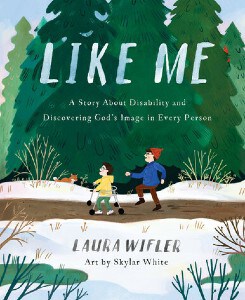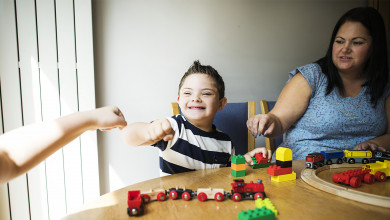Young girl: I don’t always understand what the kids are saying or why they act the way they do. Mom says it’s because God made everyone unique. We all give Him glory in different ways. If we look closely, we can learn a bit about God through each one of them.
John Fuller: Well, that’s a rather profound statement, and it comes from a children’s book called Like Me: A Story About Disability and Discovering God’s Image in Every Person. And today on Focus on the Family, we’ll hear more about children with special needs and the families who love them and care for them. Thanks for joining us. Your host is Focus president and author, Jim Daly, and I’m John Fuller.
Jim Daly: John, this is one of those programs where we want to give you a peek behind the curtain of what life looks like for families who navigate disabilities and differences. Any unique, uh, kind of normal that most of us don’t encounter. Uh, first of all, having a child with special needs is more common than most of us realize. I think it’s, uh, 20%, roughly one in five households, uh, care for a child that has unique needs. And it’s likely you probably know a family, if you don’t know them directly and know what they’re dealing with, you know a family that does have a child in that category. Uh, tragically, one of the biggest challenges these families face is feeling welcome or accepted by other people, other families. Parents of children with special needs often have a keen awareness of how their child might feel excluded because of their disability. And I think the best thing is to hit it directly and encourage those families that, uh, can encourage them.
John: Mm-hmm. Yeah. And e- we’re seeing a lot of good opportunities for inclusion of kids who are different. Uh, I was just reading an article about a school that the parents couldn’t find what they needed in one school, but there were other options. And so, uh, the field is growing.
Jim: Well, schools today offer such a plethora of services, uh, unlike when I went to school. (laughs)
John: Yeah.
Jim: It was, it was basically the basics, and do it or you’re out of there, right?
John: Mm-hmm.
Jim: Um, today, John, the parable of the great banquet that Jesus shared in Luke 14 where He said, “When you give a feast, invite the poor, the crippled-”
John: Mm-hmm.
Jim: “… the lame, the blind, and you will be blessed.” It’s interesting that the Lord himself pointed this out. To engage people that maybe don’t have all the physical or mental assets that other people have. And if you do it, He himself, the Lord himself said you’re gonna be blessed.
John: Mm-hmm. Well, we have two great guests today. Uh, both are authors and speakers and podcast hosts. Laura Wifler is the co-founder and executive director of Risen Motherhood, which is an organization dedicated to helping moms raise kids with a Godly foundation. And she wrote the book I mentioned, Like Me: A Story About Disability and Discovering God’s Image in Every Person. And our own Erin Smalley is also with us. Uh, she and her husband Greg lead the marriage team here at the ministry. And Erin is a licensed counselor as well.
Jim: Welcome, to both of you.
Erin Smalley: Thanks for having us.
Laura Wifler: Yeah, it’s a joy to be here.
Jim: And Laura, it’s your first time, so we-
Laura: It is.
Jim: … appreciate you making the effort to be in here. And let’s start with you. Um, your daughter Eden, describe Eden for us and tell us about the day when she was diagnosed.
Laura: Of course. Yeah. So Eden is my youngest daughter. She is now six years old, and she’s basically sunshine in a bottle. She is pure joy.
Jim: (laughs) Oh, that’s great.
Erin: (laughs)
Laura: She’s so much fun, lots of energy-
Jim: Yeah.
Laura: … and determination. Um, and she was diagnosed about six years ago when she was two months old. Uh, at the time, we knew maybe some things were a little bit different after birth, but we weren’t quite sure. And I have two older, regularly developing children. So just as a mom, I kind of knew, “Hey, this doesn’t feel exactly the same as it was for my other children.” So, um, as kind of my instinct took over, um, we pushed for genetic testing. And we did that, and it came back, uh, saying that she has a genetic disease called rare chromosome disorder. And essentially what that is, is just that, uh, there is a mutation or a change in her chromosomes that cause global developmental delays. So at the time, the doctors told us, “Well, we don’t really know, you know, what her future holds.” Because she was actually incredible unique. She’s the only one in the world that they know of with her diagnosis.
John: Oh, my.
Erin: Oh.
Laura: So they said, “Yeah, we’ll look at other cases that are similar, and that’s, we’ll just try to predict for you.” And so they told us that she would likely never walk and that she would likely never talk. Um, so as you can imagine, that’s a really difficult diagnosis to get-
Jim: Sure.
Laura: … for your child. And yet, they said we can be hopeful that it might be different for her. So we enrolled her in lots of therapies. And over the years, I am just so happy to say that she does walk. Um, she also does talk and she is growing in those skills every day. She still needs assistance and help and is in therapies, but, uh, she’s doing really, really well, so.
Jim: That’s good. Yeah, that’s fantastic. And that kinda lays the groundwork for the questions that we’re gonna ask you. Uh, Erin, in that-
Erin: Mm-hmm.
Jim: … same regard, you and Greg, by the way, you’re doing such a fantastic job with the marriage outreach here at Focus.
Erin: Aww, thank you.
Jim: I’m so proud that you guys are here and doing great work.
Erin: Aww, thank you.
Jim: I mean, it’s amazing, the marriages that are being saved. And, you know, when you look at this issue, particularly those couples end up-
Erin: Mm-hmm.
Jim: … with a lot of stress. And that wasn’t-
Erin: Yes.
Jim: … the question I was gonna ask you. It just dawned on me.
Laura: (laughs)
Erin: Yeah. Yeah.
Jim: ‘Cause the divorce rate can be really high-
Erin: Mm-hmm.
Jim: … with a special needs child. So maybe you could work that into your answer here.
Laura: (laughs)
Erin: Yes.
Jim: But, uh, you adopted Annie.
Erin: Yes.
Jim: And how old was Annie when she was adopted and where was she adopted from?
Erin: Yes. Annie was two weeks before her third birthday. We adopted her from China. And she was born with a condition called amniotic band syndrome which is where there’s a tear in the amniotic sack when she was in utero. And those bands come out and the wrap around the fetus. So what it caused for Annie was cleft lip and palette. Um, a limb difference on her left hand and then she had club foot. So she had multiple physical challenges. There are no cognitive delays, but when we adopted her, she had already had multiple surgeries. And over the years, she’s continued to have multiple surgeries. So she just had her 15th surgery on July 20th of this year.
Jim: And she’s how old now?
Erin: She is 16.
Jim: Yeah.
Erin: And turned 16 three days after having a pretty major surgery.
John: Mm-hmm.
Jim: Right.
Erin: And, um, so that has been challenging. And she is amazing.
Laura: (laughs)
Erin: I love hearing about Eden because Annie is this little spitfire and loves life and loves people and loves Jesus so much.
Jim: (laughs) Yeah. That’s so good. And I’ve had the privilege of interacting with her. She’s a delightful young lady.
Erin: Oh, thank you.
Jim: I mean, that’s what’s so fun to see.
Erin: Yeah.
Jim: And you guys have done a, done a terrific job-
Erin: Oh, thank you, Jim.
Jim: … encouraging her. She engages and she just goes for it, right?
Erin: (laughs) Absolutely.
Laura: (laughs)
Jim: (laughs)
Erin: She will be at church and she’ll see someone crying that she does not know-
Jim: Mm-hmm.
Erin: … and she will walk up to them and rub their back and comfort them-
Laura: Mm-hmm.
Erin: … and pray for them. I’m like, “Do you know who that is?” “No.”
John: (laughs)
Erin: “I just saw they were hurting. So I thought I would help them.” (laughs)
Jim: Yeah. ‘Cause she knows what it means to hurt.
Erin: So she knows what it means.
Jim: Let’s, uh, talk to the biblical reference, and I don’t mean this to be controversial or anything like that.
Erin: Mm-hmm.
Jim: But, um, suffering does produce fruit, uh, it’s pretty clear in the scripture, and Jesus encourages us through that suffering. I think we learn humility there. People that don’t suffer, they’re usually, and I mean just generally, I, you know, they can be pretty arrogant people because they don’t, they don’t get humbled.
Laura: Mm-hmm.
Jim: They go from treetop experience to treetop experience. But I think there’s something spiritually beneficial to suffering. How would you apply that, uh, with both of your situations as a family, and then seeing your daughters?
Laura: Yeah.
Erin: Yeah.
Laura: I mean, I would completely agree that there has been so much sanctification that’s gone on in my life. And I can point directly back to disabilities being one of the tools that God used to shape and change and form me into his character. And I could list probably thousands of reasons if I really sat down and started to think through the ways that it has formed me. But perhaps for today, you know, one of the things that comes to mind is just the development of compassion in my life and my ability. Kind of like what you were saying, of like seeing someone who’s hurting and having a generous spirit towards that. Um, I think there’s an element, especially in motherhood or parenting that we can start to feel, um, we can feel judgmental of other parents or we can sort of impose what we think they should do. And, you know, I have two regular developing children that I was like a pretty decent parent with, or I felt, you know, I could feel pretty, like you were saying.
Erin: Felt successful. (laughs)
Jim: Yeah.
Laura: Yeah, yeah. Pat on the back.
Jim: Oh, yeah. “Aren’t I good?”
Erin: Yeah.
Laura: Exactly.
Jim: (laughs)
Laura: And it’s, you know, I was set up for success.
Jim: (laughs)
Laura: And, and then I had my youngest daughter who brings in a lot of challenges and a lot of different behavioral differences and things. And it just has really challenged me and my patience.
Jim: Yeah.
Laura: And in just my ability to remain calm, to, um, not care what other people think as much. I have been surprised at the things that I have let go or said, “Hey, these aren’t important at the end of the day, you know?” And, and her behavior isn’t as much of reflection of me as a parent. So I don’t place so much on my children anymore, um, because I’m trusting God for my identity rather than my children. And so a lot of those things have been really reformed through disabilities in my life and just, um, seeing it in my whole family, but specifically in my heart, I feel like God has just really taught me who to trust.
Jim: Lemme ask you, um, and I’m putting you on the spot.
Laura: Sure.
Jim: You know, we didn’t talk about this, but-
Laura: (laughs)
Jim: … y- when the diagnosis came, just to give the, the other four out of five families…
Laura: Yeah.
Jim: … some picture of this. And, and I know we may have mentioned this later, but we all have deficits. Some may be physical, some may be mental, some emotional, some spiritual. I mean we’re born as sinners, so it will show up somehow some way. Not to equate, you know, physical or mental disability with sin, but the, the construct of being different. Take us through your emotions like diagnosis day and feeling like, “Okay, what happened here?” What would be those adjectives that you would use like stunned or whatever it might’ve been?
Laura: Yeah. Yeah. Well, to be honest in the hospital room, there were, I don’t know, maybe seven different doctors, counselors. They brought in a whole team of people.
Erin: Mm-hmm.
Laura: You know, and you know, something bad happened. They, they didn’t tell me over the phone.
Erin: Mm-hmm.
Laura: So I know this is going to be a big bomb that they’re going to drop. And I was holding my daughter and my husband was there and there’s all these people around. And in the, the moment, I remember being stunned. I remember being shocked. I remember looking at this piece of paper that they gave me with all these potential issues, and then looking at my little daughter in this peony blanket and thinking, “These don’t compute for me.”
Erin: Mm-hmm.
Laura: You know, this doesn’t add up. And there wasn’t a lot in the moment that I felt besides shock. But I remember going home that night and, you know, life went on like normal. My kids all needed to be put to bed. I needed to wash the dishes. They needed to eat. And I remember standing at the kitchen sink, the, the suds like up to my elbows and just for the first moment feeling just this deep wave of sorrow and just such sadness and grief. And just, I mean, I ca- can go back there. I mean, you can see the tears…
Jim: I can see it.
Laura: … in my eyes.
Jim: Yeah.
Laura: I can go back there very easily because it is so, it still can feel raw at times. And then as the days went on, it vacillated between joy and trust and saying, “I’m so glad that I have a God to lean on,” but also such sorrow and even anger at times. “Why? Why us? Why her? Why my child out of all the children? Why?” You know, you start to ask those questions. You start to ask, “Did I do something wrong?” Especially when it’s genetic you can kind of feel like, “Well, maybe it’s my fault.” And we worked through all those things and and it takes years. I would encourage any parent who’s going through diagnosis to allow it to take time…
Jim: Mm-hmm.
Laura: … to heal. And even still I, there will be moments where I’ll be surprised by this feeling of sorrow and sadness that comes up. And yet there’s been sort of a continual, a, a tenor or a thrum to my journey that I can look back and say, “But yet God has held me and He has kept me.”
Erin: Mm-hmm.
Jim: Yeah.
Laura: And, and there is, there’s, I want to, I can’t wait till we talk about the joy of the head of Heaven that all parents with children with disabilities get to look forward to. And, and that has really, I’ve clung to that.
Jim: Yeah.
Laura: And there’s. There’s a sure foundation.
Jim: That’s, I mean, it’s encouraging. And I think, you know, depending upon where a person and where a family is in that process…
Laura: Yeah.
Jim: … you’re still maybe in that raw spot.
Laura: Yeah, and that’s okay.
Jim: And, uh…
Laura: You know, I think it’s important-
Jim: Yeah, I like that encouragement…
Laura: … the we allow that.
Jim: … to just keep moving forward to just keep moving forward. But I think, I think again, we’re here on this earth to learn something, right? (laughs)
Erin: Mm-hmm.
Jim: That is the purpose. And the Lord is saying, in my opinion, it’s to become selfless in marriage, selfless in parenting, draw closer to him. And the irony is, it’s the tough things in life that typically move us there more quickly, not the goodies. And, uh, it’s, it’s hard for us to recognize that because we’re so me oriented.
Laura: Mm-hmm.
John: This is Focus on the Family with Jim Daly. And today we’re talking with Erin Smalley and Laura Wifler. And uh, uh, kids with differences, kids with special needs, and uh, the families who love them. Uh, we love our kids. Uh, if you’re finding encouragement here, let me, uh, suggest you get this book by Laura called Like Me: A Story About Disability and Discovering God’s Image in Every Person. It’s a terrific, uh, kids book, but you go through that with your child, um, whether your child has a disability or not. There will be, uh, Some bonding, I think, over the characters in this story. Stop by the website to get a copy. That’s focusonthefamily.com/broadcast or call 800, the letter A, and the word FAMILY.
Jim: Uh, we mentioned that stat, one in five families ha- experience this situation. For the four out of five, what do you say to those families to encourage them to engage? Everybody wants to be known. Everybody wants relationship. We’re wired for it. That’s how God built us, including these children and their families. So what advice do you both have for families that may not be dealing with this to engage a family that is?
Laura: Mm-hmm. Sure. Yeah, I think, um, there are a lot of great ways, even if you don’t have someone who’s really close to you that has a person with disabilities in their family. I think something that is really incredible about living in the age that we do is that disabilities are represented all over the place. So you can find them in media, you can find them in books, you can find it just at the grocery store even. And I think some of it is just us having eyes to see. And so as parents, I think when we are out and about, maybe it’s, um, your child does make a comment about, “Hey, you know, what’s, what’s that?”
Erin: Mm-hmm.
Laura: You know, that’s very common for young children in particular to say, like, “What’s that?” About a walker or about a wheelchair.
Jim: Right.
Laura: And as parents, I think we can immediately kind of be like, “Shh.” And want, wanna hush them and-
Erin: Mm-hmm.
Laura: … because we feel like, oh, we don’t want to be rude or offensive. But actually what we’re doing in that moment is showing that, “Hey, maybe disabilities aren’t a good thing. Maybe disabilities are something that-”
Jim: Why we don’t talk about it.
Laura: We don’t talk about.
Jim: (laughs)
Erin: Mm-hmm.
Laura: And your child reads that as that’s-
Jim: Yeah.
Laura: … that’s not something that I should bring up anymore. And instead, as parents, we can say, “That’s a wheelchair. That gives them freedom to go where they want to go.” Or you can even say, “You know, honey I’m not exactly sure but I think it’s helping that person out with maybe a disability.” And then go in the car later Google it, you know? Learn the term.
Erin: Mm-hmm.
Laura: We don’t always know the terms for disabilities. There’s, there’s a whole world that you know, if you’re in disabilities, you know how to talk about it.
Jim: Right.
Laura: But if you’re not I think sometimes that’s where people become nervous about disabilities just because they don’t want to get it wrong. They don’t want to say a word that might be offensive. They don’t want to, um, sound silly, because it kind of feels like it’s about, it’s a reflection on them. But instead, I think we can show a lot of, um, growth to our children by us starting with, with, uh, allowing our child to reflect the way that we receive it. So warm smiles, leaning in, showing that disabilities, it’s just a part of life. It’s not something that we tamper down or push away or avoid.
Erin: Mm-hmm.
Jim: Yeah. How about you, Erin?
Erin: Well, I was talking to Annie yesterday and I said, “What is that like, you know, when…” Because people stare.
Jim: Right.
Erin: And I always have tried to frame it. They’re just curious. They’re just trying to see, like, I see your hand is different. And she said yesterday, “I just wish they would say something.”
Jim: Yeah.
Erin: I wish when they’re staring at my hand, I know what they’re staring at. And sometimes now she will offer, but she just, she said, “I just wish they would say like, ‘Hey, I noticed your hand.’” And she would be happy to tell them, “Well, I was born with amniotic band syndrome and this is my hand.” Funny, when kids are little though, she would have kids look at her and go, “I don’t believe you.” (laughs)
Jim: (laughs)
Laura: (laughs)
Erin: And she’d be like, “No, I was born like this.” And-
Jim: Nothing like a seven year old physician.
Erin: Yes.
Jim: (laughs)
Erin: A social worker, Annie told that story at like age seven and the social worker said, “Well, then you look at them and you say, ‘This conversation is over.’” (laughs)
Jim: Wow. That’s adult like, right?
Erin: So she has had lots of practice of how to respond.
Jim: Yeah. Laura, let me ask you this other data point. And in some ways I think a person could read this in a negative light. I kind of saw it in a more positive light with room to grow. But the data point is that one in three, uh, families with special needs don’t feel supported by their local church. Now, I just want to say that means two in three do.
Erin: Yeah.
Jim: That’s the positive side of it.
Laura: Yeah.
Jim: But there is room to grow, because you’d want everybody to feel that support.
Laura: Mm-hmm.
Jim: Where does it get a little clunky within the church, and where might we improve?
Laura: Mm-hmm.
Jim: And what are the things that churches are doing well?
Laura: Mm-hmm. And this is a wonderful question. And I think that it’s, it’s also very difficult to talk about at such a high level because it is so individual with different churches. And yet, I think the general encouragement for churches would be to move beyond just ADA regulations. I think sometimes-
Jim: Get the ramp.
Laura: Yeah, right. We’re going to get the elevator, the ramp, and the parking stalls and like, “Check, we are now disability friendly.” And especially for families and, and people with disabilities themselves, that doesn’t quite go far enough. You know, I think that there is an element of being a welcoming space and some churches are going to have programs for people with disabilities and children with disabilities. Some churches are not going to be able to do that due to budget and staffing and lots of many good reasons. And so my biggest encouragement for churches is to just have someone who is on point with eyes to see that can go up to a family or individual with disabilities and just say, “Hey, I noticed you’re new here. I noticed that you guys might have different requirements. How can we make your time successful at our church?”
Erin: Mm-hmm.
Laura: And that question can be answered in a lot of ways, and some won’t be attainable for the church, right? Some families will want special rooms or a singular aid. And I’ve talked with so many families who say, “We’re trying to make this work. What can we do?” And, you know, I think there’s an element of pursuing unity, like Paul talks about.
Jim: Yeah.
Laura: Of saying, “First and foremost, we want this child to be safe. We want you to feel welcome. We want to pursue unity, but also here’s what’s possible with our church and the budget and the staffing that we have.” And, and allow though the church to come around, because I think you’d be surprised with the number of people who say, “Well, I’m willing to be an aide.”
Erin: Mm-hmm.
Laura: “I’m willing to help, or I’m willing to teach in this different way.” And yet we can also trust that God is moving and working. And even when we are not using special curriculums or maybe don’t have special spaces, that God’s word is powerful enough to even reach that child’s heart with a disability.
Erin: Mm-hmm.
Jim: Yeah. And that is so good. I would encourage a pastor to talk about it from time to time.
Erin: Yes.
Laura: Absolutely. Talk about it from the pulpit.
Jim: Here’s, here’s what we need to be and kind of burst that bubble…
Erin: Yes, yes.
Jim: … so nobody is afraid to engage.
Laura: Yeah. Or even hosting-
Jim: Yeah.
Laura: … an equipping course or a training class.
Erin: Yeah.
Jim: Yeah, yeah.
Erin: Yes.
Laura: I think that those are very underrated.
Jim: I know on the foster side, uh, churches in Florida, we learned were doing such a great job. Some of those churches, uh, were assigning a volunteer to meet the family at the door.
Laura: I love that.
Jim: And they would go with the child and be with the child in Sunday school…
Laura: Awesome.
Jim: … and then reunite the child and sit in the class-
Laura: Yeah.
Jim: … with that child.
Erin: Awesome.
Laura: Yeah, my daughter has an aide.
Jim: Think of that in the special needs context.
Laura: It’s a gift.
Jim: If you had a volunteer at church…
Laura: Mm-hmm.
Jim: … who met the family at the door.
Laura: Yeah.
Jim: Took, uh, the child in and gave a break to the parents…
Laura: Yeah.
Erin: Mm-hmm
Jim: … to worship and do the things they need to do. That’d be a good thing to do.
Erin: Absolutely. And I also think that we need to support the marriage.
Jim: Yes.
Erin: The, the parents in their marriage-
Jim: We didn’t mention that.
Erin: … and how do we best do that as a church, you know, providing, um, help when we have a marriage seminar that those parents can go or respite care. Just being available to support them so they can focus on their marriage.
Laura: Mm-hmm.
Erin: It’s so important.
Jim: You know, um, right at the end here, it flew by. That’s a good sign that it was a great conversation. (laughs)
Laura: (laughs)
Jim: I hope people listening believe that too. Boy, just really, uh, uh, understanding that God’s in control of all things. I would think these families and you’ve lived it, so correct me if I’m wrong. In the beginning, you doubt that holy.
Laura: Mm-hmm.
Jim: You know, God’s really in control.
Laura: Mm-hmm.
Jim: Is He looking at our life right now? And, and that’s okay. God’s big enough to take it. Um, how do you maintain your faith in God as you move through this process and believe in his goodness, uh, despite your present reality? And let me just say, this is good advice for all of us.
Laura: Mm-hmm.
Jim: Not just those that may have a disability or a family with a disability.
Laura: Mm-hmm. You know, for me, I mentioned this a bit earlier, but the hope of Heaven has been vital to my faith in God throughout this journey. And I think what is so key here is that Heaven is real and that is not a small statement.
Jim: What is that hope that you have?
Laura: Yeah, it’s the fact that we live in light of redemption of the gospel. That I know that Christ died for me and that He gave his life up for me and He gave his life up for my daughter. And that someday I’m going to be reunited with him in Heaven. And that revelation talks about God wiping every tear from our eyes. No more sorrow, no more pain, no more tears. And that is a beautiful picture that I cling to of saying, “Okay, this life, if it’s…” You know, if I’m, I’m going 40, 50, 60 more years, maybe with where I’m at, that is just a blip on the radar…
Jim: Yeah.
Erin: Mm-hmm.
Laura: … of the beauty of Heaven and eternity and spending of my God there. And so I can do a lot here and now, and my goal in life, like you said earlier, is to be sanctified. It’s to grow more and more like Christ, to become more like Him every day. And if this is what He chooses for me to grow like him, well, I want to receive that. I want to, I wanna say, “Yes, Lord, I receive this because this is preparing me for glory.”
Jim: Yeah.
Laura: And that kind of hope, knowing that Heaven waits for me, it has just been so integral, I think, for me being able to say, “So I can go one more day here.”
Jim: Yeah.
Laura: “I can have one more day of being sanctified, one more day of being patient, one more day of loving my daughter.” Even when things are hard, one more day of trusting God, even when I’m not really sure, you know?
Erin: Mm-hmm.
Laura: And, and I can. I can have an overarching trust that knows that He has a plan and he’s sovereign.
Jim: And the thing, uh, for families that aren’t, um, dealing with this kind of situation, I think we think of Heaven and we’ll be together and we’ll be doing the things that you do in Heaven. But for you, both of you and everyone you represent, think of Eden in Heaven. So she’s running and she’s not gibberish now.
Erin: Yeah.
Jim: She’s speaking words of truth, and she’s completely whole and…
Erin: Yeah.
Jim: … and living eternity.
Laura: Mm-hmm. It’s a real unique hope for anyone who has a disability or has a disease or sickness to know that full healing is coming.
Erin: Yes.
Jim: Yeah, completion.
Erin: Yes. And I, Annie said yesterday, um, as she was reflecting on her surgery, she said, “You know, God prepared me in…” I was like, “Oh, I didn’t even know she was thinking about this.” She said, “You know, 14 surgeries before this 15th one.”
Jim: Wow.
Erin: “And He used each one of those to prepare me because He knew how bad this one was going to be.” And, but I know that He prepared me and He gave me the strength. He didn’t just prepare me physically. He prepared me emotionally and spiritually and mentally.”
Jim: Wow.
Erin: And I thought, “You know what, Annie, you have no idea…” (laughs)
Laura: Mm-hmm.
Erin: “… all that He is preparing you for.”
Jim: Mm-hmm.
Erin: “Because He is not going to waste one ounce of your pain, of your differences, of who you are, because He equipped you exactly the way He wanted you. And He is not going to waste it. He will use it.” And I, I just sat there smiling, thinking, “I just can’t wait to see what God has for you.”
Jim: Yeah.
Laura: Mm-hmm.
Erin: “… as a young woman, as an adult, and all that he’s going to do in and through you.”
Jim: Yeah. That’s so good. And Annie and Eden are blessed to have you two as moms, man… (laughs)
Laura: Mm-hmm.
Jim: … and all the moms out there that are doing a big job and hopefully dads too, like you, John.
Laura: Mm-hmm. (laughs)
Jim: So appreciate that. And man, this has been so good. It has flown by, but we want to encourage you. Let’s get you started with a copy of, uh, Laura’s wonderful book, Like Me, and you can get in touch with the ministry and as we normally do, if you can make a gift to be part of the ministry, we’ll send it as our way of saying thank you. If you can’t afford it, this is important. We want you to have this in your home so you could be reading it. I was thinking of a book I used to read to the boys. I think I read it maybe 250 times to them.
Laura: (laughs)
Erin: (laughs)
Laura: Oh, my goodness.
Jim: Um, something about the moon, I can’t remember.
Laura: (laughs)
Jim: But (laughs) I mean, yeah, this is a much better book in that regard.
Laura: (laughs)
Jim: And, uh, we just want to get it into your hands. So get in touch with us and let’s do ministry together and let’s put a great resource into your hands.
John: Yeah. We’re listener supported, uh, viewer supported for uh, our YouTube viewers. Make a donation today as you can and request that book, Like Me. Uh, we’ve got all the details at our website. That’s focusonthefamily.com/broadcast or call us. You can donate and, uh, get that book, uh, when you call 800, the letter A, and the word FAMILY. And if you’re struggling, if maybe you’re one of, uh, those people who don’t feel supported by a church, you feel all alone in what this journey is, um, give us a call. We have caring Christian counselors. Our donors make that possible. They’ll connect with you, they’ll hear you out, they’ll offer resources, and they can point you to somebody in your local area if you have an ongoing need for that. Again, those counselors can be reached by calling the phone number or stop by the website.
Jim: Again, Laura and Erin, thanks for being with us. This has been really good. I appreciate it.
Erin: Thank you so much for having me.
Laura: Yeah, glad to be here.
John: And thank you as well for joining us for this episode of Focus on the Family with Jim Daly. Coming up tomorrow, we’ll explore why change is often a lot harder than we expect.
Preview:
Debra Fileta: It’s not just about behavior modification from the outside. We have to get underneath the surface and figure out the roots and what’s going on from the inside if we really want to see change.
John: On behalf of Jim Daly and the entire team, thanks for listening to Focus on the Family. I’m John Fuller inviting you back as we once again help you and your family thrive in Christ.
End of Preview




















